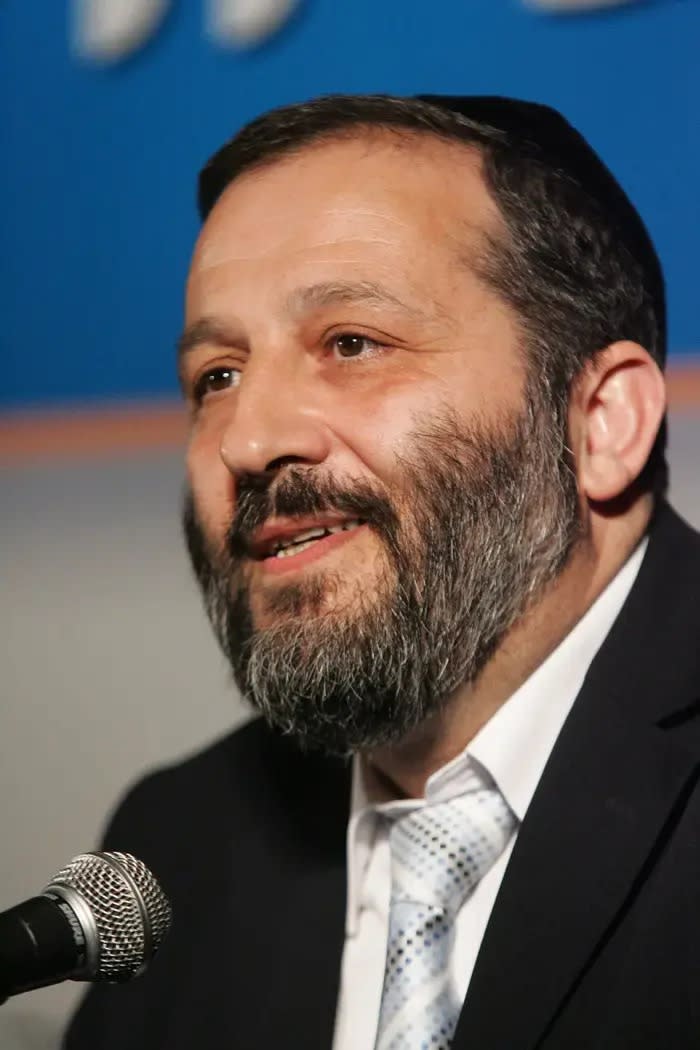Amid the haredi draft debate, Shas is dragging Israel into its past traumas - opinion

Expecting Netanyahu and Deri to act right overlooks their leadership failures, transforming the conscription crisis from a potential Shas triumph into disaster for the State of Israel.
A historic opportunity stood before Shas: to be a true bridge of balance, not only in terms of seats in the Knesset but also in terms of bringing Israeli society together, secular and religious, Ashkenazi and Sephardi. What a shame that it turned out that all the Sephardi revolution in the world of Torah truly wants these days is simply a hug from the Ashkenazi hegemony.
Here's a true story: Almost 30 years ago, we were looking for a caregiver for our eldest daughter. Even before meeting with the caregiver, on the first phone call, she asked us if we minded that she was Orthodox. We didn't.
She was a Gerrer hassid, her husband worked in a hassidic education system considered extreme and strict even in the ultra-Orthodox world. What was important to us was that her children loved our daughter as if she were their little sister, fought over her attention, amused her and showered her with affection. Along with our little one, there were two other children also in her care, a girl and a boy, and in order to differentiate between the two girls, they gave them marks: the one who was darker they affectionately called "Chocolate Delight."
The intention was good, of course, but already in the mid-1990s, no liberal in central Tel Aviv felt comfortable calling a person by their skin color.
That epithet was a trigger for conversations during which I learned about racial segregation, just like that, which exists in certain streams of ultra-Orthodox society. While among secular Jews of Ashkenazi descent, racism mainly survives as vague biases among the generation that is passing away from the world, then within the ultra-Orthodox community, it sometimes manifests in actual racial discrimination.
And then I began to understand the roots of the strong emotions that gave birth to Shas, the black panthers of ultra-Orthodox politics.
Memories of Charlie Biton
The black panthers, spoken of frequently in recent weeks following Charlie Biton's death, were the generation that embodied the auto-emancipation of tradition-bound Sephardi and Mizrahi Jews. They set the streets on fire but were burned by the flames of revolution.
The fruit of the "not nice" struggle (as Golda Meir called them after their protests, showing absolute blindness in social matters that must be remembered when foolishly attempting to correct historical memory) was reaped by Likud, an Ashkenazi party, but also one that, as a political underdog, offered an ideological safe home to traditional Mizrahim and Sephardim even during the days of the pre-state underground.
The black panthers ignited the flames of rebellion, but the Torah of Israel proved to be stronger than the Marxist ideology that the rebels adhered to. For every Charlie Biton who went to Hadash or Saadia Marciano to Sheli (both leftist parties), there were a hundred who yelled "Begin, Begin" when Menachem Begin delivered his "Jews, brothers, fighters" speech in King George Square during the 1981 elections.
Where did this social revolution get stuck? With Benjamin Netanyahu and David Amsalem. The former knew how to exploit it cynically for his own needs, and the latter proved that Likud and the system are not important; the main thing is power: We chose power to arrange jobs for our cronies and to plunder the public coffers, not because it's necessary, but because "the other" has plundered them in front of us. Imitation instead of change.
If the spirit of skepticism from the United States only arrived in Israel in the seventies, then the religious revolution that took place in secular politics in the seventies only arrived in the ultra-Orthodox society in the eighties with Shas. The problem with Shas was the speed with which it became a central player in the power system: if Likud matured for almost 30 years in opposition, then Shas became a ruling party from the very beginning and, therefore, acted like a gang of kids in a candy store.
Even those who became important political leaders within a few years, like Arye Deri, reluctantly acknowledged this. His (first) trial was initially presented as political-religious persecution, but Deri, released from prison, sought to present himself as someone who learned a lesson in humility, who understood he had sinned out of arrogance, who humbled his heart until he ignored the rules of the game.
Interest vs Vision
The problem is the gap between what Deri says and what he does. Outwardly, he made sure to convey love for Israel and unity, only raising a fuss when Yair Lapid allegedly looked down on him, while the rest of the time he preferred the position of the underdog, the one who doesn't understand why people could possibly be against him.
At times, it seemed that the will of the Shas's supporters for unity of Israel and the party's political practice reached a point of connection: Deri "contributed" to the coalition agreement that allowed the emergency government during COVID (how it ended, we all know), Deri also insisted that we all know how moderate and thoughtful he is in all matters related to war strategy. The problem with Deri is that when the public good conflicts with his political benefit, he chooses the latter.
This is how he navigated Shas out of the Rabin government, just when it seemed like the haredi Mizrahim would offer a different approach to the Israeli-Arab conflict. This was when he understood that Netanyahu was dragging Israel towards less, but he chose a tactic where every note to Shas was like a note to Netanyahu, just like a direct vote for Likud.
This is what he is doing now, when his party so easily betrays the moral convictions of many of its voters, not ultra-Orthodox but religious or traditional, who saw voting for Shas as a tribute or longing for the generation of parents, whose children serve in the IDF and work for their livelihood after their release. They were the narrow bridge over which a real outline of ultra-Orthodox recruitment could pass, instead they choose the Shas to preserve the their power.
Let there be no doubt, this is not a struggle of the world of Torah against Israel's security, as Sephardi Chief Rabbi Yitzhak Yosef tried to portray. This is about the politics of survival at the expense of doing the right thing.
Will the two walk together unless they have agreed?
The alliance between Deri and Netanyahu is based not only on a shared political interest, but also on several similarities. For example, one got into trouble because of Jacuzzis, and the other because of cigars and champagne – interesting, for leaders who claim to represent the general public.
The naive expectation from them is that at the moment of truth, they will straighten up and do the right thing: Deri, who will supposedly shake up the system from within even though he himself is the essence of the system, and Netanyahu, who will supposedly straighten up and represent some national interest, not political or sectarian, for a moment.
If there is anything that's comparable with the hatred felt by a large part of Netanyahu's opponents for the prime minister, it is only the expectation that at the moment of truth, a different Netanyahu will be revealed, different from all we knew, statesmanlike and responsible. They wave a sign calling for his resignation, but deep down, they hope, for unclear reasons, that the man who could have been will emerge.
National disaster
If the cynicism of the two is annoying these days, then these days it borders on crime: the Haredi recruitment issue threatens not only the current government but the future of the entire State of Israel.
Deri (who practically controls the chief rabbi who is supposed to guide his spiritual ways) could have been the architect of the solution, but instead he chose to be a central part of the problem. Why? As sad as it may sound, it is about feelings of inferiority: the association of Torah-observing Sephardim that rose up against the Ashkenazi Litvak haredi leadership is like a son who rebels against his father but longs more than anything for a paternal hug from him.
The speech of Rabbi Yosef is meant to show that he is "more Ashkenazi than the Ashkenazim," more extreme than the extremists. Just like Netanyahu wants to settle the score with those who prevented his father from being a leading political figure just because he did not belong to the "correct" political stream.
On a personal-human level, this is certainly understandable. Ultimately, many of us become not the product of our childhood dreams, but the sum of their traumas. On a national level, this is a tragedy: the State of Israel is forced to move forward and heal its wounds, but instead it is dragged back to reopen the wounds that shaped the character of those who are supposed to lead it. A country yearning for a better future is dragged into the abyss of their past traumas.
Jerusalem Post Store
`; document.getElementById("linkPremium").innerHTML = cont; var divWithLink = document.getElementById("premium-link"); if (divWithLink !== null && divWithLink !== 'undefined') { divWithLink.style.border = "solid 1px #cb0f3e"; divWithLink.style.textAlign = "center"; divWithLink.style.marginBottom = "15px"; divWithLink.style.marginTop = "15px"; divWithLink.style.width = "100%"; divWithLink.style.backgroundColor = "#122952"; divWithLink.style.color = "#ffffff"; divWithLink.style.lineHeight = "1.5"; } } (function (v, i) { });



